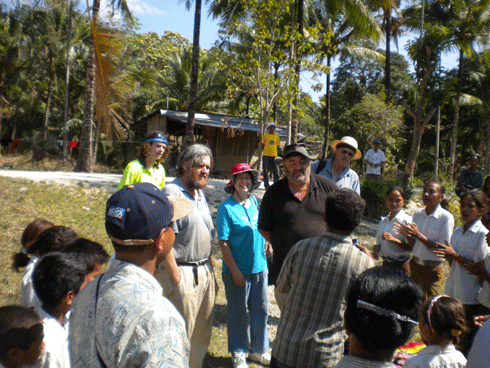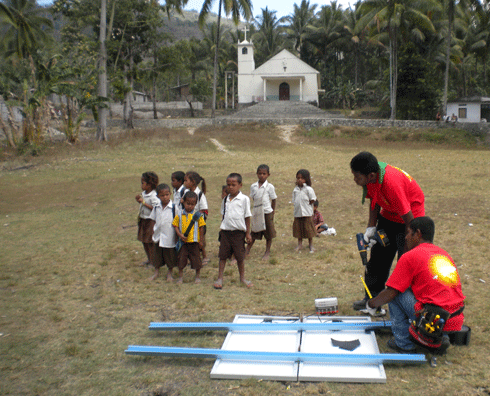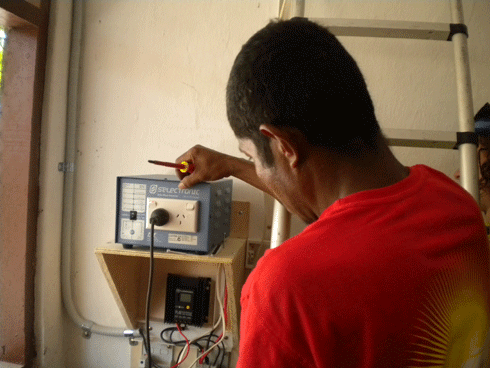
|
Published: 6 February 2012
(Solar) power to the people of Timor Leste
It is approaching dusk as the vehicles complete their five-hour trek from Dili and come to a stop outside the community centre in Baguia, Timor Leste. We are greeted by the local school teachers and shown to the guest house that will be our home for the next five days.

|
|
Volunteers from the ATA are welcomed to Baguia, Timor Leste, by local school teachers and school children. Credit:
ATA
|
I am part of a team that is here to install two solar-power systems in the town centre and an outlying school as part of the Alternative Technology Association (ATA)’s long-term volunteer efforts in Timor Leste. Back in Dili, other teams are preparing to travel to different regions for installation and training programs.
The ATA is a not-for-profit organisation promoting renewable energy, sustainable building and water saving in the home. In 2001, a group of ATA members interested in assisting low-income communities in South-East Asia and the Pacific with technologies appropriate to their needs established an International Projects Group (IPG).
The IPG has since carried out the bulk of its projects in Timor Leste. Other projects have been located in Vanuatu, Papua New Guinea, and Indigenous communities within Australia.
The solar installations at Baguia are typical of the standalone power systems being installed in clinics, community centres and community-based enterprises in remote locations across the country.
The community centre’s system will provide power for the office, 17 laptops, sewing machines, musical instruments and other equipment used to provide training for the community and support small business activity.

|
|
Every aspect of the solar installation project attracted the curiosity of local schoolchildren. Credit:
ATA
|
IPG installation teams include electrical engineers, certified installers and Australian and local volunteers. Apart from installing the systems, the IPG operates several related renewable programs and activities, including:
-
a small household lighting system (also known as a village lighting scheme), whereby every house in the community is fitted with lighting
-
training in photovoltaic technology, including the development and delivery of a ‘train the trainer’ program for the country’s electrical trade teachers
-
consultancy with nongovernmental organisations (NGOs) and government departments.
Our focus is on appropriate technology. By working with local communities and partners with local knowledge and skills, the IPG is helping communities gain access to sustainable technologies and skills appropriate to their needs. This approach aims to empower communities to make their own decisions on how to improve their quality of life.
In other words, we believe that sustainable development is about more than technology: it is about the people who live with and maintain the systems.
Our team includes certified workplace trainers, who have developed training programs in collaboration with technical institutions in East Timor. The IPG has also trained local personnel, giving them the capacity to monitor and maintain installed systems.

|
|
Training local people to monitor and maintain the systems is part of every IPG project. Credit:
ATA
|
Another ATA project is based at the Tua Ko’in Eco-Village, a community-owned tourist facility on the island of Atauro, just off the coast of Dili.
The eco-village is managed by Roman Luan, a community-based NGO on Atauro, which supports the community to better manage the island’s natural resources and make more informed decisions about appropriate levels of tourism.
‘[Tua Ko’in’s new solar power] system provides lighting and refrigeration for our staff and customers,’ commented Roman Luan Trainer/Advisor, Mr Gabriel Sampson. ‘[The ATA] agreed to use a local electrician in the installation work and transferred a number of skills to him.’
Elsewhere in Timor Leste, in the district of Aileu, the IPG has also made a lasting contribution, according to Deputy District Administrator Mr Mario Antonio Soares.
‘The ATA has a long history of engagement with Aileu,’ says Mr Soares. ‘Through their work, we have provided lighting and electricity to health clinics, community and administration centres. They have also impressed me with their dedication to training locals in solar power.’
Timor Leste is a mountainous country with many remote communities in hard-to-access areas. Roads are often in poor condition, or washed away, during the wet season. Distances are measured in hours, not kilometres.
Even with a national electrification program underway, many communities and homes will not have reliable mains power for years, if ever. And, when a location is remote from the power grid, options for installing energy sources are limited to candles, kerosene lamps or a generator.
From our experience, solar power systems, such as those installed via a village lighting scheme, are more cost effective than kerosene lamps or candles. Further, the cost of fuelling a generator is far greater than the cost of operating a solar power system.
With a cost of between AU$150 and $1500, solar power provides a cheaper source of light than fossil fuel options. The key difference financially is that while solar power systems have a high set-up cost, they have very low running costs. Generators or kerosene lamps may be much cheaper to set up, but ongoing fuel bills can quickly become large and unwieldy.
Larger solar power systems are used when there is a need for appliances such as computers, printers and medical equipment. These vary in size and price, with smaller systems starting at around AU$2000 and larger systems in the order of $20 000.The price is related to how much power is used. Choosing efficient appliances helps lower the price dramatically.
The IPG projects in Timor Leste are a wonderful partnership between Timorese communities, local administration, Australian volunteers, community groups and electrical and renewable energy industries. All partners actively contribute to the special and lasting impact of IPG projects on local development.
Michael O’Connell is an engineer and ATA volunteer with skills in solar and renewable energy and training. If you would like to be part of the IPG program, visit the ATA website to register your interest. |




